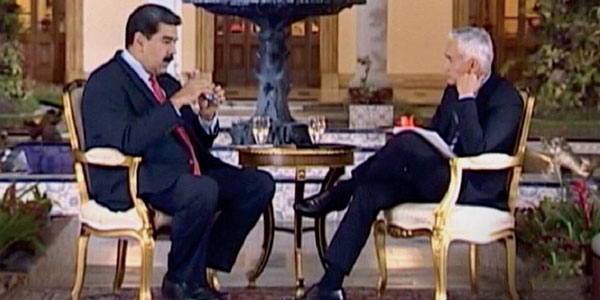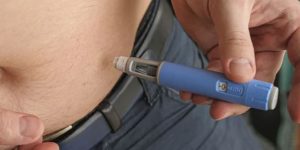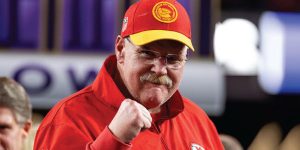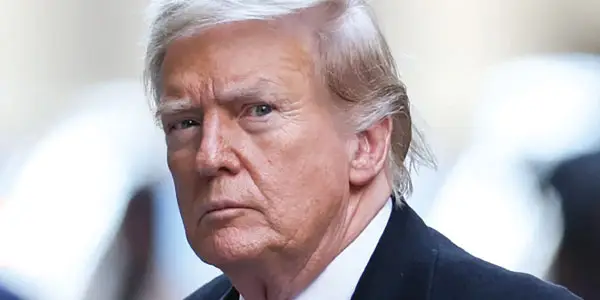
By Jorge Ramos
How should you interview a dictator? That was the question I asked myself before my conversation with Nicolás Maduro of Venezuela in Caracas on Feb. 25. I had watched Maduro’s interviews with other journalists and decided I wanted to do something different: I would ask tough questions right from the start, forcing Maduro to engage in back-and-forth conversation and be less long-winded. That’s exactly what I did.
I’ve been saying for years that the primary responsibility of journalists is to challenge those in power. (You can watch my 2017 TED Talk on the subject here.) In this case in particular, when I’m talking to someone who has been accused of fraud, corruption, murder and torture, I have an obligation to be true to my principles and ask hard questions.
The purpose of my first question was to set the tone. “You are not the legitimate president,” I said to Maduro. “So how should I address you?” (Venezuela’s opposition has its own name for the president: “Usurper.”)
My job during the interview, which was held at the Miraflores presidential palace, was to expose Maduro as a dictator. Maduro’s task, on the other hand, was to explain why we should consider him the legitimate president of Venezuela. Confrontation was inevitable.
That’s the interview I had planned. Other people had wanted me to ask more respectful questions, or so I’ve read on social media. But I firmly believe that dictators should be treated as such. “Presidents do not go around killing their people,” I said to Maduro.
Let’s forget for a moment the myth of journalistic neutrality. When we’re dealing with discrimination, racism, corruption, lies and human rights violations, we have to take a stand. Journalists act as critical counterweights to those in power. Reporters should by no means interview a dictator the same way they would a victim of that dictator.
What makes Maduro illegitimate? He took office following two fraudulent presidential elections (in 2013 and 2018), and has since abused his powers, with terrible consequences. According to Foro Penal, a Venezuelan human rights organization, 793 political prisoners are locked up by the Maduro regime; Human Rights Watch has documented 380 cases of abuse, including torture. Hugo Carvajal, the former head of Venezuelan military intelligence, who has since turned against Maduro, said in a statement that the president has “killed hundreds of young people in the streets for trying to claim the rights you [Maduro] stole.”
I had come to the interview armed with this evidence and more, to show that Hugo Chávez’s Bolivarian Revolution has been an utter failure. Maduro, of course, saw things differently. First he tried to discredit my sources; then he resorted to insults and intimidation. “If you were a Venezuelan you would be brought before the authorities,” he told me. Then he added: “You’re going to choke on your provocation, with Coca-Cola.” If members of the international press receive these kinds of threats, imagine the risks that Venezuelan journalists face.
As you now know, just 17 minutes into our conversation, Maduro called off the interview. His communications minister, Jorge Rodríguez, seized our cameras and the memory cards on which our exchange had been stored. The other six members of the Univision crew and I were then held for more than two hours, before being deported the next day.
Recently, however, we were able to get our hands on some of the footage from that interview. This material, which we received via confidential sources, isn’t the footage we recorded, but what Maduro’s officials were recording at the same time, with their own equipment (such additional recording is a common practice in many countries). That’s why, as soon as the video stops, the words “Palacio de Miraflores” appear on the screen.
In recovering our interview this way we managed to defeat Maduro’s censorship. And yes, it belongs to us. In the end, no interview is the property of the interviewee. (You can view the footage here.)
This episode also shows that people from Maduro’s inner circle are willing to betray their boss. This regime is crumbling from within.
In speaking with me, Maduro completely failed to present himself as a democratic leader. It is impossible to do when you detain journalists, take their cameras and censor their work.
Just after he stopped our interview, I said these words to Maduro’s face: “That’s exactly what dictators do.” Is there anyone out there who disagrees?
__________________________________________________________________________
La Entrevista al Dictador
¿Cómo entrevistas a un dictador? Esa es la pregunta que me planteé antes de conversar con Nicolás Maduro, el Presidente de Venezuela, en el Palacio de Miraflores en Caracas el pasado 25 de febrero. Había estudiado las entrevistas que le hicieron otros periodistas en las semanas anteriores y yo quería algo distinto; preguntas difíciles desde el principio, forzándolo a entrar en una conversación y evitando respuestas largas como sermones. Y eso es lo que hice.
Llevo muchos años diciendo que la principal función social del periodista es cuestionar a los que tienen el poder. (Aquí está mi plática TED del 2017 https://bit.ly/2ym0xpt.) Y cuando te enfrentas a alguien — como Maduro — acusado de fraude, corrupción, asesinatos, tortura y de tener presos políticos, mi obligación era ser congruente con mis principios y hacerle preguntas duras.
La primera pregunta sentaría el tono de la conversación. “Usted no es el Presidente legítimo”, le dije a Maduro, “¿Cómo le llamo?” La oposición lo considera un “usurpador”. Mi trabajo era demostrar a lo largo de la entrevista que Maduro era un dictador; el suyo tratar de argumentar que era el verdadero Presidente de Venezuela. La confrontación, lo sabía antes de empezar, iba a ser inevitable.
Esa es la entrevista que yo me planteé. Otros he leído en las redes, hubieran preferido preguntas abiertas, coyunturales y un trato más “respetuoso”. Pero yo creo que a los dictadores hay que tratarlos como dictadores. “Los presidentes no matan a su gente”, le dije.
Dejemos a un lado el mito de la neutralidad periodística. En casos de discriminación, racismo, corrupción, mentiras públicas, violación a los derechos humanos y dictaduras nos toca tomar partido. Somos contrapoder. Para eso sirve el periodismo. No es lo mismo entrevistar a un dictador que a una víctima de su dictadura.
La ilegitimidad de Maduro se basa en los dos fraudes electorales que lo llevaron al poder (2013 y 2018) y en los abusos de su autoridad que generaron cientos de muertes y presos políticos. (Foro Penal registró 793 presos políticos, Human Rights Watch ha documentado 380 casos de abusos, incluyendo tortura, y su ex jefe de inteligencia, Hugo “el Pollo” Carvajal, lo acusó de haber “asesinado a cientos de jóvenes en las calles por reclamar los derechos que les robaste”.)
Yo llevaba datos, cifras y casos que demostraban el terrible fracaso de la revolución bolivariana. Maduro, desde luego, lo veía de otra manera. Quiso desacreditar mis fuentes, luego intentó los insultos y terminó tratando de intimidarme. “Si fueras venezolano tendrías que enfrentarte con la justicia”, me dijo. Y también: “Te vas a tragar con Coca-Cola tu provocación”. Si la prensa internacional recibe esas amenazas ¿se imaginan el riesgo que sufren los periodistas venezolanos?
Como saben, después de 17 minutos de conversación, Maduro la dio por terminada y su ministro de comunicaciones, Jorge Rodríguez, confiscó nuestras cámaras de televisión y las tarjetas de video donde grabamos la entrevista. El equipo de seis personas de Univisión fue detenido por más de dos horas y, al día siguiente, nos deportaron de Venezuela.
Pero hace poco recuperamos la entrevista. Gracias a fuentes confidenciales — cuya identidad vamos a proteger — obtuvimos una copia de la entrevista. No es la que nosotros filmamos. Es la que el gobierno de Maduro grabó simultáneamente y con sus propias cámaras. (Esa práctica es común en muchos países.) Eso explica que, cuando termina el video de la entrevista, aparece una gráfica que dice: “Palacio de Miraflores”. Y eso también significa que gente del mismo entorno de Maduro traicionó a su jefe. El régimen se está desmoronando desde dentro.
Lo importante aquí es que vencimos la censura y recuperamos nuestra entrevista. Sí, es nuestra. Ninguna entrevista le pertenece al entrevistado.
Si Maduro quería demostrarle al mundo que él era un demócrata, se equivocó. Eso nunca se logra deteniendo periodistas, robándose sus cámaras y censurando. Como se lo dije, en su cara, mientras se iba: “Eso es lo que hacen los dictadores”.
¿Alguien tiene la menor duda?
Posdata. Hasta hoy no nos han regresado nuestros equipos. Pero aquí está la entrevista que Maduro no quería que vieras: bit.ly/2KkRs5H.









